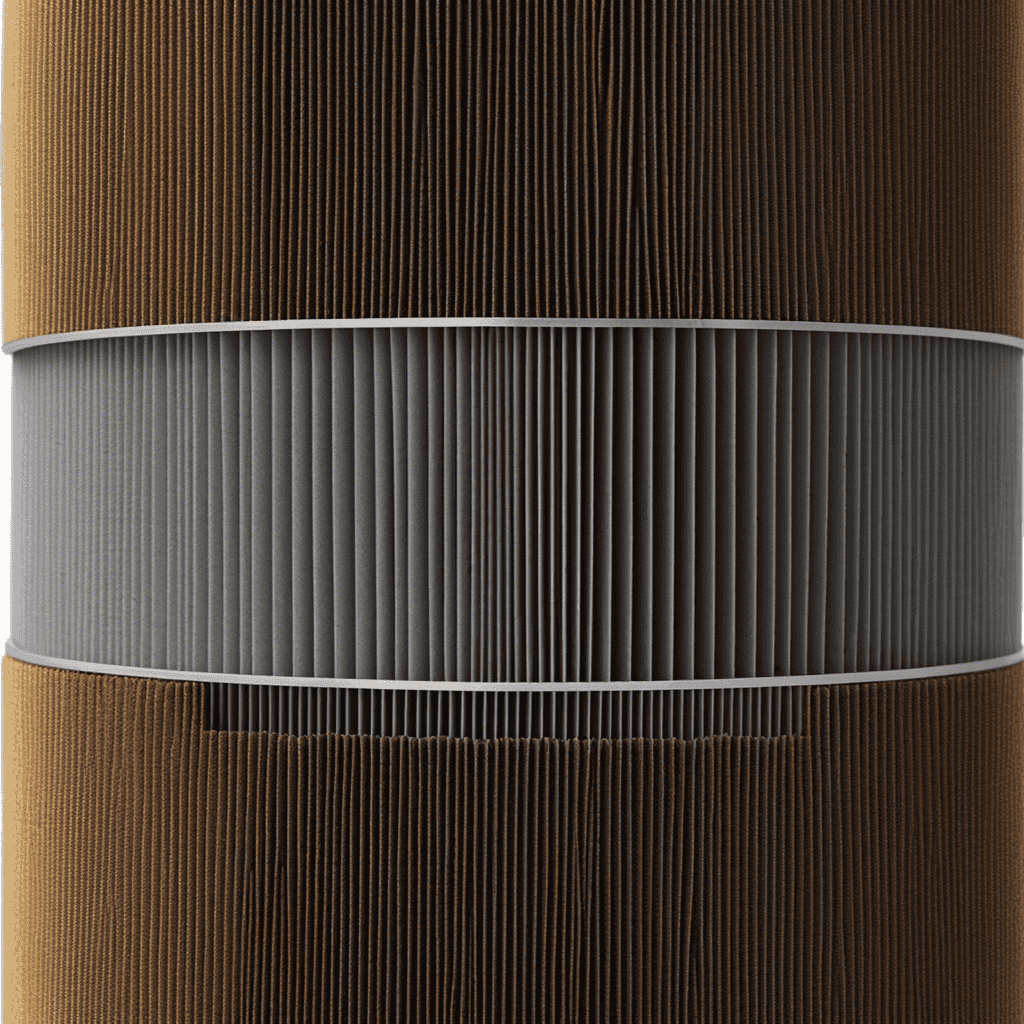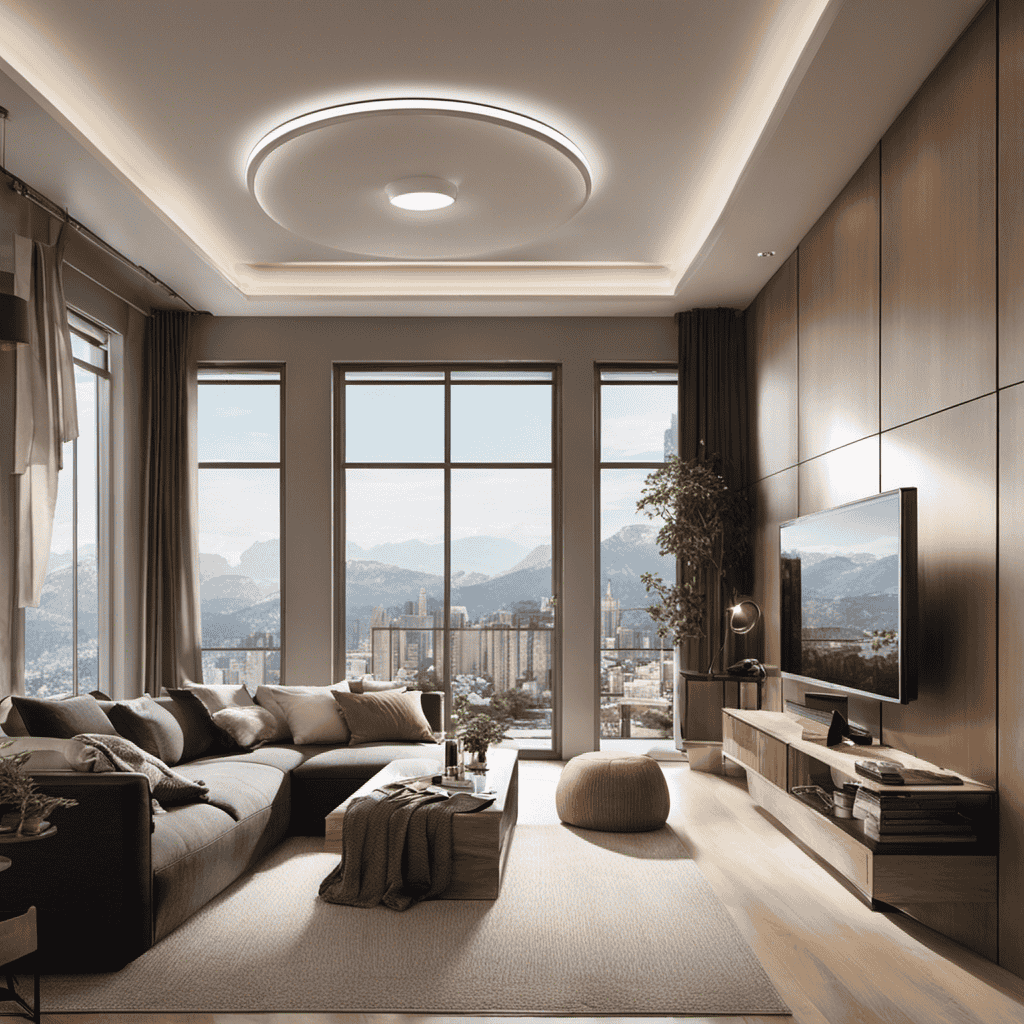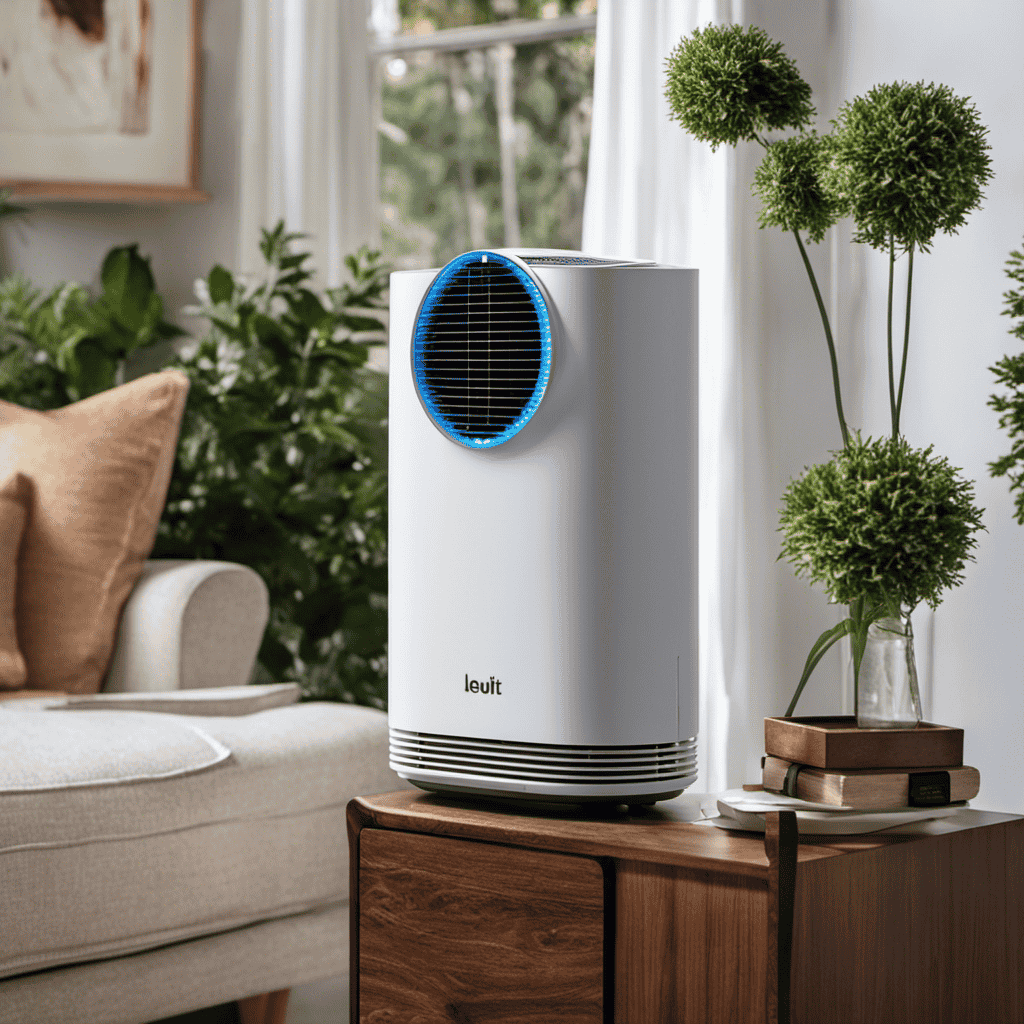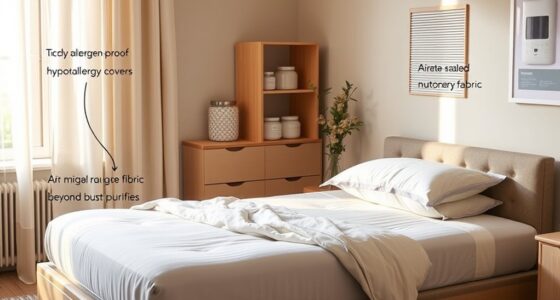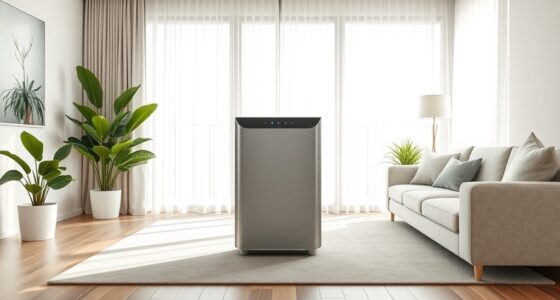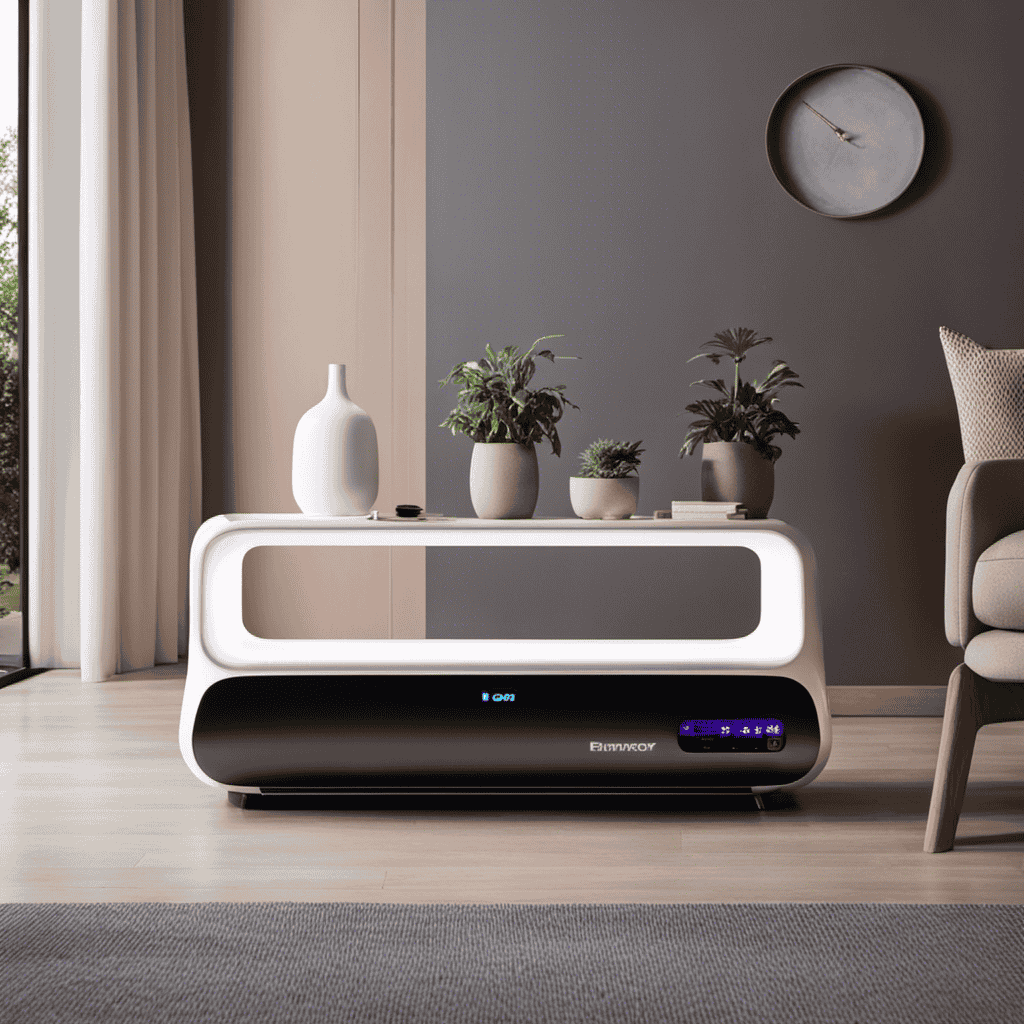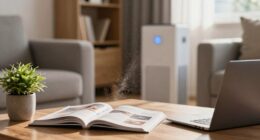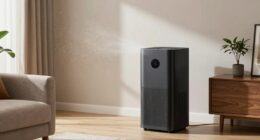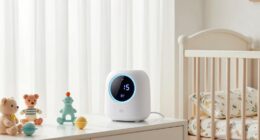I change my HEPA filter frequently, it feels like I am constantly in a marathon of filter replacements! However, it definitely pays off.
If you want to keep your air purifier running at its best, you’ve got to know how often to change that filter. Lucky for you, I’ve done the research and I’ve got all the answers.
In this article, I’ll break down the factors that affect filter lifespan, provide manufacturer’s recommendations, and give you tips on extending the lifespan of your trusty air purifier.
Let’s get started!
Key Takeaways
- Air quality in your home and the presence of pollutants affect the lifespan of HEPA filters in air purifiers.
- Most manufacturers recommend replacing HEPA filters every 6 to 12 months for optimal performance and to maintain clean and healthy air.
- The frequency of filter replacement may vary based on factors such as air quality, usage, and the presence of pets or high pollution sources.
- Regularly checking the filter for dirt, dust, or discoloration, and monitoring its performance are important in ensuring the effectiveness of the air purifier and improving air quality.
Factors Affecting Filter Lifespan
To determine the factors affecting the lifespan of your air purifier’s HEPA filter, you should consider the air quality in your home and the frequency of usage.
Proper filter maintenance is crucial for maximizing its efficiency. The air quality in your home plays a significant role in how long the filter will last. If you live in an area with high pollution or have pets, the filter may get clogged more quickly. Regularly vacuuming and dusting can help reduce the amount of particles that enter the air purifier.
Additionally, the frequency of usage also affects the filter’s lifespan. If you use the air purifier for extended periods or in rooms with continuous air pollution sources, the filter may need to be replaced more frequently.
It’s important to follow the manufacturer’s guidelines for filter replacement to ensure optimal performance and clean air in your home.
Manufacturer’s Recommendations
In discussing the subtopic of filter lifespan guidelines and optimal replacement frequency, it is important to consider the manufacturer’s recommendations. Following these guidelines ensures that the air purifier continues to effectively remove pollutants from the air.
Filter Lifespan Guidelines
Make sure you regularly check the manufacturer’s guidelines for the lifespan of your air purifier’s HEPA filter. Following the manufacturer’s recommendations is crucial to ensure that your air purifier functions effectively.
Most manufacturers suggest replacing the HEPA filter every 6 to 12 months, depending on usage and air quality. However, it’s important to note that these guidelines can vary, so always refer to the specific instructions provided by the manufacturer.
Signs of a dirty filter include a decrease in air purifier performance, reduced airflow, and an increase in dust and allergens in your living space. If you notice any of these signs, it’s time to replace the filter.
Regularly changing your HEPA filter will help maintain clean and healthy air in your home.
Optimal Replacement Frequency
You should consult the manufacturer’s guidelines to determine how frequently you should replace your filter for optimal performance. However, as a general rule, most air purifier filters, including HEPA filters, should be replaced every 6 to 12 months. This timeframe may vary depending on factors such as the air quality in your area and the usage of your air purifier.
To ensure the longevity and efficiency of your filter, here are some filter maintenance techniques to keep in mind:
- Regularly check the filter for signs of dirt, dust, or discoloration.
- Vacuum or gently brush the filter to remove loose particles.
- Avoid washing HEPA filters, as this can damage their effectiveness.
Frequency Based on Usage
To keep your air purifier running efficiently, it’s important to know how often you should change the HEPA filter based on your usage.
Filter maintenance is crucial for the effectiveness of your air purifier in removing airborne particles and improving indoor air quality.
The filter replacement schedule varies depending on factors such as the size of your home, the number of occupants, and the level of pollutants in your environment.
For light usage, such as in a small apartment with minimal airborne contaminants, it is recommended to replace the HEPA filter every 6 to 12 months.
However, for heavy usage in a larger home or in environments with high levels of pollutants, it may be necessary to change the filter every 3 to 6 months.
Regularly monitoring the filter and following the manufacturer’s guidelines will ensure that your air purifier continues to work effectively to provide you with clean and fresh air.
Signs of a Dirty Filter
Poor air quality can have a significant impact on our overall health and well-being. When the air in our homes or workplaces is filled with pollutants and contaminants, it can lead to a range of respiratory issues and allergies.
In addition, a dirty air filter can reduce the efficiency of airflow in our air purifiers, making it harder for them to effectively remove harmful particles from the air. As a result, we may experience increased allergy symptoms and find it harder to breathe in clean, fresh air.
Poor Air Quality
If you’re experiencing poor air quality, it’s important to regularly change the HEPA filter in your air purifier. Regularly changing your HEPA filter helps to remove common air pollutants, improving the air quality in your home and reducing the risk of health issues.
Here are some common air pollutants and their potential health effects:
-
Particulate Matter (PM): These tiny particles can penetrate deep into our lungs, causing respiratory problems and aggravating conditions like asthma and allergies.
-
Volatile Organic Compounds (VOCs): Found in household products, VOCs can cause eye, nose, and throat irritation, as well as headaches and dizziness.
-
Carbon Monoxide (CO): This colorless and odorless gas can be lethal, causing symptoms like dizziness, nausea, and even death in high concentrations.
Reduced Airflow Efficiency
After discussing poor air quality, it’s crucial to understand how filter maintenance affects air purifier efficiency.
Regularly changing the HEPA filter is essential to ensure optimal performance. Over time, the filter becomes clogged with pollutants like dust, pollen, and pet dander. When the filter is dirty, it obstructs the airflow, reducing the air purifier’s efficiency. As a result, the device may struggle to clean the air effectively, leaving you exposed to harmful particles.
To maintain the highest level of performance, it is recommended to follow the manufacturer’s guidelines on how often to change the filter. By doing so, you can ensure that your air purifier functions efficiently, providing you with clean and healthy air.
Now, let’s explore how reduced air purifier efficiency can lead to increased allergy symptoms.
Increased Allergy Symptoms
Regularly maintaining your air purifier can help prevent increased allergy symptoms. When pollen levels are high, it’s important to ensure that your air purifier is working effectively to filter out allergens. Here are three key maintenance tips to keep in mind:
-
Clean or replace the HEPA filter: The HEPA filter is the heart of your air purifier. Over time, it can become clogged with pollen and other particles, reducing its effectiveness. Regularly cleaning or replacing the filter will help maintain optimal performance.
-
Clean the pre-filter: Many air purifiers have a pre-filter that captures larger particles like dust and pet hair. Cleaning or replacing this filter regularly will prevent it from becoming a breeding ground for allergens.
-
Check the airflow: A decrease in airflow can indicate a clogged filter or other issues. Regularly check and clean the vents and fan to ensure proper airflow and maximum efficiency.
Impact of Air Quality on Filter Lifespan
To ensure the longevity of your HEPA filter, you’ll want to consider the impact of air quality on its lifespan. Filter maintenance is crucial for optimal performance and efficiency. Air pollution can significantly affect the filter’s efficiency, causing it to clog up faster and reducing its ability to capture airborne particles effectively. Regularly monitoring and improving air quality can help prolong the lifespan of your HEPA filter. Here is a table illustrating the impact of different levels of air pollution on filter efficiency:
| Air Quality | Filter Efficiency |
|---|---|
| Excellent | High |
| Good | Moderate |
| Fair | Low |
| Poor | Very Low |
Common Mistakes in Filter Replacement
When it comes to maintaining optimal air quality in your home, there are a few key points to keep in mind.
Firstly, the timing for filter changes is crucial in ensuring that your air purifier is functioning at its best.
Secondly, proper filter installation is essential to ensure that the air is effectively filtered and contaminants are removed.
Lastly, regular maintenance is of utmost importance to ensure the longevity and efficiency of your air purifier.
Timing for Filter Change
Make sure you’re aware of the timing for changing your HEPA filter in your air purifier. Following the manufacturer’s recommendations is crucial to ensure optimal performance.
The lifespan of your filter depends on various factors, including the air quality in your environment. Here are a few points to consider:
- Frequency of use: The more you use your air purifier, the more frequently you’ll need to change the filter.
- Air quality: If you live in an area with high pollution or allergens, the filter may need to be replaced more often.
- Pets and smoking: If you have pets or smoke indoors, these factors can decrease the lifespan of your filter.
By being mindful of these factors, you can ensure that your air purifier is working effectively to provide you with clean and healthy air.
Remember to regularly check the filter and replace it as needed to maintain optimal performance.
Proper Filter Installation
Now that we know when to change the HEPA filter in our air purifiers, let’s discuss the proper techniques for filter installation. Installing a filter correctly is essential to ensure optimal performance and efficiency of your air purifier.
Firstly, carefully read the manufacturer’s instructions to understand the specific installation requirements for your air purifier model. Generally, filter installation involves removing the old filter and replacing it with a new one. It’s important to handle the filter with clean hands or wear gloves to prevent any contamination.
One common mistake is installing the filter upside down or backwards. Always check for arrows or markings on the filter that indicate the proper direction of airflow. Additionally, ensure the filter is securely placed and properly aligned within the air purifier to avoid any gaps or air leaks.
Importance of Regular Maintenance
Regular maintenance is crucial for ensuring optimal performance and efficiency of your air purifier. Neglecting proper maintenance can lead to a decrease in air quality and the effectiveness of your purifier. Here are some common maintenance mistakes to avoid and the benefits of regular filter replacement:
-
Forgetting to clean the pre-filter: The pre-filter captures larger particles and should be cleaned or replaced regularly to prevent clogging and maintain airflow.
-
Not changing the HEPA filter on time: The HEPA filter is responsible for trapping smaller particles, and if not replaced periodically, it can become overloaded, reducing its efficiency and increasing strain on the purifier.
-
Ignoring the overall unit cleaning: Dust and debris can accumulate on the exterior and vents, hindering airflow and affecting the purifier’s performance.
Regularly replacing filters ensures that your air purifier continues to effectively remove pollutants, allergens, and odors from your indoor environment, promoting cleaner and healthier air for you and your family.
Do All Air Purifiers Have Hepa Filters
You should check if all air purifiers have HEPA filters. HEPA filters are highly effective in capturing small particles like dust, pollen, and pet dander.
However, not all air purifiers come equipped with HEPA filters. Some models use different types of filters, such as activated carbon filters or electrostatic filters. These filters have their own benefits and are designed to target specific pollutants.
It’s important to understand the type of filter used in your air purifier as it will determine the frequency of filter replacement. HEPA filters typically need to be replaced every 6-12 months, depending on the manufacturer’s recommendations and the air quality of your environment. Other filters may have different replacement schedules, so it’s essential to refer to the user manual for specific instructions.
Regular filter replacement ensures optimal performance and cleaner air in your home.
Extended Filter Lifespan Techniques
To prolong the lifespan of your air purifier’s filter, try implementing these techniques:
-
Clean the filter regularly: One of the most common mistakes in filter maintenance is neglecting regular cleaning. By cleaning your filter on a monthly basis, you can prevent dust and debris from clogging it, ensuring optimal performance.
-
Use a vacuum cleaner: Instead of simply wiping the filter, use a vacuum cleaner to remove embedded particles. This helps to maintain the filter’s efficiency and extends its lifespan.
-
Follow manufacturer’s guidelines: Each air purifier comes with specific instructions for filter maintenance. Be sure to read and follow these guidelines to avoid any potential damage to the filter and ensure long-lasting performance.
Regular filter cleaning offers several benefits. It improves the air quality by removing pollutants and allergens more effectively. Additionally, it enhances the air purifier’s efficiency, leading to lower energy consumption and cost savings.
Understanding Filter Maintenance
Cleaning your air purifier’s filter regularly is essential for maintaining optimal performance and prolonging its lifespan. Neglecting filter maintenance can lead to decreased air quality and reduced efficiency of your air purifier. To highlight the importance of filter maintenance, let’s take a look at the following table:
| Filter Maintenance Importance | Filter Cleaning Techniques |
|---|---|
| Prevents clogging and blockage | Vacuuming |
| Removes dust, pollen, and allergens | Rinsing with water |
| Extends the life of the filter | Using a brush to remove debris |
| Improves air purifier’s efficiency | Using compressed air for deep cleaning |
Regularly cleaning your air purifier’s filter ensures that it continues to effectively capture and remove airborne particles, maintaining a healthy indoor environment. Vacuuming and rinsing with water are simple and effective techniques for removing dirt and dust. Using a brush can help dislodge any stubborn debris, while compressed air can provide a more thorough cleaning. By following these filter cleaning techniques, you can keep your air purifier functioning optimally and enjoy cleaner air in your home.
Filter Replacement Guide for Different Models
When it comes to filter replacement, two key points to consider are the optimal filter replacement frequency and the compatibility of replacement filters.
Knowing how often to replace your filters is crucial to maintaining the effectiveness of your air purifier or HVAC system.
Additionally, ensuring that the replacement filters you choose are compatible with your specific model will guarantee optimal performance and filtration efficiency.
In this discussion, I will delve into these two important aspects of filter replacement and provide valuable insights to help you make informed decisions.
Optimal Filter Replacement Frequency
You should regularly check the manufacturer’s recommendations for the optimal frequency to change your HEPA filter in the air purifier. The efficiency of your air purifier’s filter can be affected by various factors, such as the level of pollutants in the air, the frequency of use, and the quality of the filter itself. Regular filter maintenance is crucial for maintaining clean and healthy indoor air.
Here are some benefits of regular filter maintenance:
-
Improved air quality: Regularly changing the HEPA filter ensures that it can effectively capture and remove airborne particles, such as dust, pollen, pet dander, and mold spores, from your indoor air.
-
Longer lifespan of the air purifier: A clean HEPA filter allows the air purifier to function optimally, reducing strain on the motor and other components, which can extend the overall lifespan of the device.
-
Cost savings: By regularly changing the filter, you can prevent the buildup of particles, which can lead to decreased airflow and reduced efficiency. This can result in lower energy consumption and potentially lower utility bills.
Compatibility of Replacement Filters
Make sure to check the compatibility of replacement filters for your air purifier before purchasing them. It is important to ensure that the replacement filter you choose is compatible with your specific air purifier model. Compatibility concerns arise because different air purifiers may have different sizes and designs for their filters. Using an incompatible filter can lead to poor performance and decreased effectiveness in removing pollutants from the air. To help you evaluate the compatibility of replacement filters, here is a table highlighting some popular air purifier brands and their corresponding filter compatibility:
| Air Purifier Brand | Compatible Filter Models |
|---|---|
| Brand A | Model 1, Model 2 |
| Brand B | Model 3, Model 4 |
| Brand C | Model 5, Model 6 |
How to Properly Clean a Hepa Filter
To properly clean a HEPA filter, it’s important to follow these steps:
- Turn off the air purifier and unplug it from the power source.
- Carefully remove the HEPA filter from the air purifier. Refer to the manufacturer’s instructions if you’re unsure how to do this.
- Gently tap or brush the filter to remove any loose dust and debris. Avoid using excessive force, as this could damage the filter fibers.
Common cleaning mistakes to avoid when cleaning a HEPA filter include:
- Washing the filter with water. HEPA filters are not washable and water can damage their effectiveness.
- Vacuuming the filter. While it may seem like a quick and easy way to clean the filter, vacuuming can also damage the delicate filter fibers.
Filters for Allergy Sufferers
In my previous subtopic, I discussed how to properly clean a HEPA filter. Now, let’s dive into the importance of filter maintenance and its effectiveness for allergy sufferers. Maintaining your air purifier’s filters is crucial to ensure its optimal performance in removing allergens from the air. Regularly cleaning or replacing the filters will help maintain their effectiveness in trapping particles like dust, pollen, and pet dander. To give you a clearer picture, here’s a table outlining the recommended maintenance schedule for different types of filters:
| Filter Type | Maintenance Frequency |
|---|---|
| Pre-filter | Every 1-3 months |
| HEPA filter | Every 6-12 months |
| Carbon filter | Every 6-12 months |
Following these guidelines will help ensure that your air purifier operates efficiently and provides relief to allergy sufferers. Remember, a well-maintained filter is a key factor in maintaining the filter’s effectiveness in improving air quality.
Longevity of Different Filter Brands
The longevity of various filter brands can vary significantly. It is important to consider the lifespan of different brands when choosing a filter for your air purifier.
Here is a comparison of filter longevity and the impact of filter quality:
-
Brand A: This filter brand is known for its durability and can last up to 12 months. It is made with high-quality materials that effectively capture pollutants and allergens, ensuring clean air for a longer period of time.
-
Brand B: With an average lifespan of 6 months, this filter brand offers decent performance. However, it may not be as effective in capturing smaller particles and may require more frequent replacements.
-
Brand C: This filter brand has a shorter lifespan of around 3 months. While it may be more affordable, it may not provide the same level of filtration as other brands, resulting in lower air quality over time.
When comparing the longevity of different filter brands, it is important to consider the impact of filter quality on air purification effectiveness. Higher quality filters may last longer and provide better air filtration, ensuring a healthier living environment.
Factors to Consider When Buying Replacement Filters
When buying replacement filters, there are several factors to consider. One important factor is cost. Affordable filters are popular, but it’s crucial to remember that the quality of the filter can impact air purification. It’s best to find filters that offer a good balance between price and quality. Cheaper filters may save money upfront, but they may not be as effective in purifying the air.
Another factor to consider is compatibility. It’s essential to check the specifications of your air purifier to ensure the filter you are purchasing is compatible. Using the wrong filter can result in poor performance and potential damage to your air purifier.
Additionally, consider the lifespan of the filter before making a purchase. Some filters may need to be replaced more frequently, which can add up in terms of cost over time.
Are the Terms “Change” and “Replace” Interchangeable When Referring to the Hepa Filter in an Air Purifier?
When it comes to your air purifier, understanding how often you should replace HEPA filter is essential. Although change and replace are often used interchangeably, in this case, the terms are not synonymous. Changing the HEPA filter refers to cleaning or vacuuming it, while replacing means getting a new one.
Extending the Lifespan of Your Air Purifier
To extend the lifespan of your air purifier, you should regularly clean and maintain it according to the manufacturer’s guidelines. Here are some techniques to help you get the most out of your air purifier’s filters:
- Vacuum or wipe down the exterior of the unit to remove dust and debris.
- Clean or replace pre-filters regularly to prevent them from clogging and affecting the performance of the main HEPA filter.
- Use a soft brush or compressed air to remove dust from the HEPA filter, or follow the manufacturer’s instructions for cleaning.
When it’s time to replace your air purifier’s filters, there are a few factors to consider:
- Filter compatibility: Ensure that the replacement filters are compatible with your specific air purifier model.
- Filter lifespan: Look for filters with a longer lifespan to minimize the frequency of replacements.
- Filter quality: Consider the efficiency of the filters in capturing pollutants and allergens.
Frequently Asked Questions
Are There Any Specific Cleaning Methods or Techniques for Extending the Lifespan of a HEPA Filter?
I’ve found some techniques to extend the lifespan of a HEPA filter. Regular vacuuming of the pre-filter, avoiding excessive moisture, and keeping the air purifier in a clean environment can all help maintain the filter’s effectiveness.
Can I Use a HEPA Filter From a Different Brand in My Air Purifier?
I wouldn’t recommend using a hepa filter from a different brand in your air purifier. It’s important to use a compatible filter to ensure optimal performance and the benefits of a hepa filter in air purifiers.
How Often Should I Clean the Pre-Filter or Pre-Filter System in My Air Purifier?
I clean the pre-filter or pre-filter system in my air purifier every 1-3 months to maintain optimal performance. Using a pre-filter helps to capture larger particles, prolonging the life of the HEPA filter and improving overall air quality.
Is It Necessary to Replace the Carbon Filter in Addition to the HEPA Filter?
I replace my carbon filter every 6 months, in addition to the HEPA filter. This ensures optimal air purification by removing odors, chemicals, and volatile organic compounds. The benefits of using a carbon filter are significant.
What Are Some Common Mistakes to Avoid When Replacing or Cleaning a HEPA Filter in an Air Purifier?
When replacing or cleaning a hepa filter in an air purifier, it’s important to avoid common mistakes. Proper maintenance for hepa filters includes handling them gently, following manufacturer guidelines, and not forgetting to replace them regularly.
Conclusion
After diving into the world of air purifiers and HEPA filters, it’s clear that maintaining clean air in our homes is essential.
By understanding the factors that affect filter lifespan and following the manufacturer’s recommendations, we can ensure our air purifiers are working efficiently.
Regularly replacing dirty filters and considering the quality of air in our surroundings will greatly impact the longevity of our filters.
For allergy sufferers, finding the right filter can make all the difference.
So let’s embrace the power of clean air and extend the lifespan of our air purifiers for a breath of fresh air every day.
